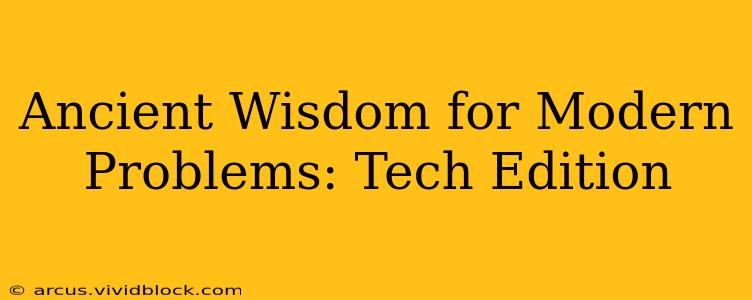The rapid advancement of technology has ushered in an era of unprecedented innovation, connecting billions and reshaping our world in profound ways. Yet, amidst this digital revolution, we grapple with challenges both new and eerily familiar. Surprisingly, ancient philosophies and wisdom traditions offer surprisingly relevant solutions to many of our modern tech-related problems. By examining these timeless principles, we can navigate the complexities of the digital age with greater clarity and purpose.
What are the ethical concerns surrounding artificial intelligence?
The rise of artificial intelligence (AI) presents a complex web of ethical dilemmas. Ancient philosophies, particularly those emphasizing virtue ethics like Confucianism and Aristotelian ethics, offer frameworks for navigating these issues. Confucianism's emphasis on ren (benevolence) and li (ritual propriety) encourages us to design and use AI in ways that benefit humanity and uphold social harmony. Similarly, Aristotelian ethics, with its focus on eudaimonia (flourishing), suggests we should strive to create AI systems that contribute to human well-being and avoid those that cause harm or perpetuate inequality. Consider the potential for AI bias—ancient wisdom urges us to rigorously examine our algorithms for fairness and strive for impartiality, ensuring AI serves all members of society equitably.
How can mindfulness help with technology addiction?
Technology addiction, a pervasive issue in our hyper-connected world, mirrors ancient struggles with various forms of excess. Mindfulness practices, rooted in traditions like Buddhism, offer potent antidotes. Cultivating awareness of our thoughts, feelings, and behaviors allows us to recognize the triggers and patterns driving our technology use. By practicing mindful presence, we can break free from compulsive engagement and reclaim control over our relationship with technology. Techniques like meditation and mindful breathing can help us develop the self-awareness necessary to manage our screen time effectively and create healthier digital habits.
How can ancient wisdom help with digital privacy concerns?
The issue of digital privacy resonates with ancient concerns about personal integrity and the importance of boundaries. Stoicism, with its emphasis on self-control and inner strength, provides a powerful framework for navigating the complexities of data collection and surveillance. By focusing on what we can control—our own actions and reactions—we can lessen the impact of external threats to our privacy. Stoic principles encourage us to prioritize our values and cultivate resilience in the face of digital intrusions. This involves being mindful of the information we share online and actively seeking ways to protect our digital footprint.
How can we use technology to promote ethical and sustainable practices?
Ancient traditions often emphasize living in harmony with nature and practicing moderation. These principles offer guidance for developing ethical and sustainable technology practices. Taoism, for example, champions living in accordance with the Tao (the natural order), encouraging a mindful and balanced approach to technological development and use. This means considering the environmental impact of technology, promoting responsible resource consumption, and designing systems that minimize harm to the planet. We can harness technology to promote sustainability by creating tools and platforms that foster responsible consumption, support renewable energy, and facilitate environmental conservation efforts.
Can ancient philosophy help me manage digital overload?
The relentless stream of information in the digital age can lead to information overload and mental fatigue. Ancient practices like the Confucian concept of zhongyong (the doctrine of the mean) encourage balance and moderation. Applying this principle to our digital lives means cultivating mindful consumption of information. Instead of passively absorbing everything, we can actively choose what we engage with, prioritizing quality over quantity. This involves cultivating the discipline to limit screen time, unsubscribe from unnecessary notifications, and carefully curate our online experience.
In conclusion, while the technological landscape may have changed dramatically, the fundamental human experiences of striving for balance, pursuing virtue, and seeking meaning remain constant. By integrating ancient wisdom into our modern lives, we can navigate the challenges and opportunities of the digital age with greater clarity, intention, and purpose. The wisdom of the ancients serves not as a replacement for modern solutions but rather as a powerful complement, guiding us towards a more ethical, balanced, and fulfilling relationship with technology.

